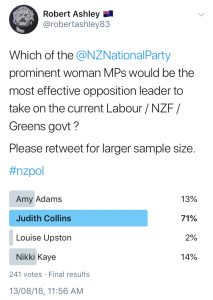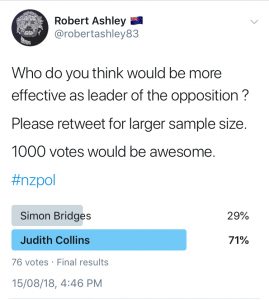Power to the people.
August 19, 2018For the sake of democracy either citizens referendums are binding, or the MMP party threshold is lowered, government can’t have it both ways.
John Key told New Zealand that he thought citizen’s initiated referendums were to expensive, he subsequently set about changing the nations flag by way of a government referendum at a cost to tax payers of $26 million.
For $50k + gst (Spending limit on petitions) he could have had his answer on what kiwis thought about his flag idea..
In a government were the power is concentrated amongst two parties who are very much the same flavour. (Labour & National) We are dependent on smaller parties working the fringes, feeling out policy ideas, testing public opinion, if the Nats or Labour see potential they cut a deal as a coalition partner in return for supporting a smaller party in a particular electorate, case in point would be the National & ACT arrangement in Remuera as well as previous coalition deals with the Maori party and United Future.
Since MMP has came about, the establishment parties have locked out the smaller parties at 5%, diluting there influence on government policy. Labour & National have a stranglehold on power.
Since 1999 New Zealand has had 3 controversial citizen initiated referendums.
New Zealanders were asked if we should reduce the number of MPs, 81% voted yes.
Kiwis were asked if our justice system needed reforming by placing greater emphasis on the needs of victims, providing restitution and compensation, while imposing minimum sentences and hard labour for all serious violent offences. 92% voted yes.
Parents were asked if a smack as part of parental correction be considered a criminal offence in New Zealand. 87% voted no.
Not one of these three referendums were binding, the government effectively ignored the public.
One significant criticism of binding citizens initiated referendums (BCIR) is that they can have fiscally adverse effects, therefore the right framework work needs to be put in place to ensure adequate cost controls.
But, what is the cost on the nation by allowing establishment parties to maintain the stranglehold on power, by continuing with the status quo, failing to advance the prosperity of New Zealand and the living standards of its residents.
The government can’t have it both ways, either make way for binding referenda, or reduce the threshold for smaller parties to enter government.



 Posted by robsrants
Posted by robsrants

